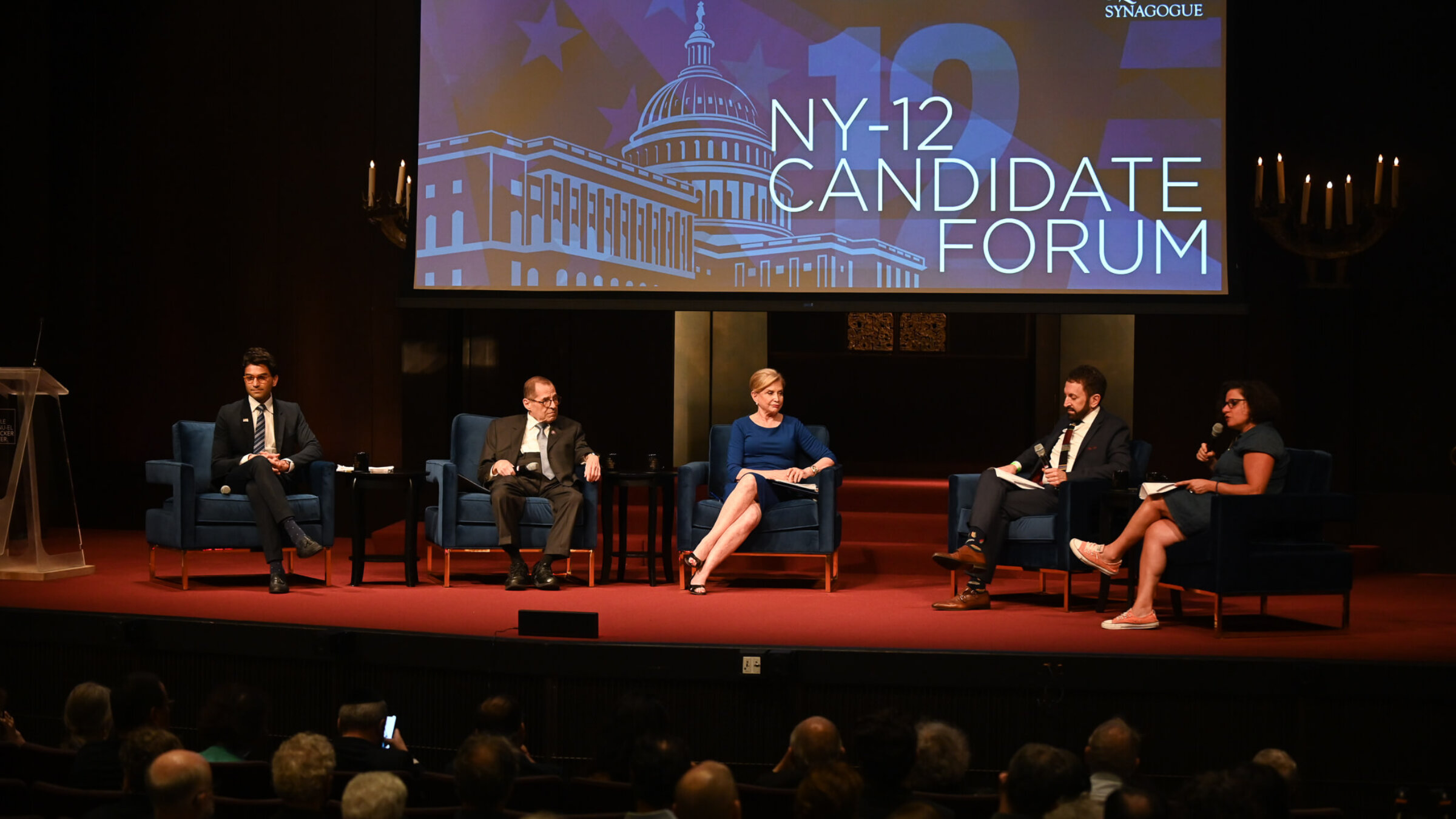What I learned moderating a congressional candidate debate
They like seeded bagels. They love Israel and hate BDS. And one of them can’t seem to follow a countdown clock

From left to right, NY-12 Democratic primary candidates Suraj Patel, Rep. Jerry Nadler, and Rep. Carolyn Maloney at a debate moderated by Matt Nosanchuk and Jodi Rudoren. Photo by Gili Getz
This is an adaptation of Looking Forward, a weekly email from our editor-in-chief sent on Friday afternoons. Sign up here to get the Forward’s free newsletters delivered to your inbox.
The lone Jewish member of the House of Representatives from New York City likes a poppy seed bagel topped with lox and tomato, ideally from Tal Bagels on Broadway and 91st Street on the Upper West Side. The veteran Democratic congresswoman that redistricting has forced to face off against him in the Aug. 23 primary also is a poppy person, but takes hers — from the shop across from her Upper East Side office — toasted with cream cheese.
And the millennial newcomer aiming to unseat both of these septuagenarians favors Tompkins Square Bagels, a joint he noted “just got barely cut out” of the district they’re all vying to represent in Washington, New York’s 12th.
“I’m a everything egg bagel, toasted, with salmon, with lox, tomato, onion, and jalapeño cheddar cream cheese,” said the newcomer, Suraj Patel, a lawyer and son of Indian immigrants who worked in the Obama Administration. “I’m a complex person.”
The bagel orders were not the most substantive thing I learned about the candidates during the 75-minute forum I co-moderated this week with Matt Nosanchuk of New York Jewish Agenda, but they were among the most scintillating. (Especially Patel’s: jalapeño cream cheese? With lox?) As with so many things, the best insights I drew from the debate came not so much from what the candidates said about any particular policy issue but how they said it; whether they answered the questions asked or stuck to practiced talking points; the phrases they repeated; the rules they didn’t follow.
Rep. Jerry Nadler, who’s been making a Very Big Deal about his status as NYC’s only Jewish House member — and as the senior Jewish member of the House overall — slumped somewhat in his chair and several times finished his answers with plenty of time left on our countdown clock. Rep. Carolyn Maloney, who definitely wants you to know that she is a woman who cares about women’s issues like abortion, kept running over her allotted 60 seconds no matter how many times we warned her or tried to cut her off.
How do they make decisions?
A gazillion years ago in political time, when I was covering the 2004 presidential campaign for The New York Times, the great political reporter Adam Nagourney gave me some sage advice. I was what we called a “candidate reporter,” the successors to “Boys on the Bus” that Timothy Crouse chronicled in his book about the 1972 campaign. That means I traversed the campaign trail day-to-day, first with Howard Dean and then with John Kerry.
The campaigns wanted us to file mostly about what the candidates said on the trail. The problem with that is, they said the same thing at every stop. We’d all memorized their stump speeches; pool reports — the notes reporters share with their colleagues when access to an event is limited — literally said things like “modified stump,” with code words for each regular riff. We were seeking something more original: scoops about strategy shifts, slips of the tongue, sharpening of attacks, Actual Human Interaction With Voters — anything but modified stump.
Adam offered a different way of thinking about the whole enterprise. “Your job is to tell voters how the guy makes decisions,” he advised. It was only a few years after 9/11, and he reminded me that we have no idea when we cast ballots in November what the politicians might actually have to deal with during their terms. The nuances of their policies on health care or education matter far less than how they will respond to a crisis. What kind of people do they surround themselves with? What kind of manager are they? How do they treat their staff? And, yes, how they make decisions about the things that matter more than bagel toppings.
There is little daylight among these three candidates’ positions on the Jewish issues we focused on at the forum. (You can read Jacob Kornbluh’s article about it here, and a take by Laura E. Adkins, our opinion editor and a resident of the district who remains undecided, here.)
They are all pro-Israel supporters of a two-state solution to the Palestinian conflict. They love the Abraham Accords (Nadler: “It’s probably the only thing in the world that I congratulate President Trump for.”). They are ardently anti-BDS (Maloney called it B.S., Nadler said it violates free speech.) They are appalled by rising antisemitism but offered little in the way of concrete ideas to combat it.
They all want to expand the Supreme Court and put terms limits on the justices. (Patel would also like term limits for members of Congress, especially, I imagine, the two he is trying to unseat.)
The race, in a district where nearly a third of the population is Jewish, highlights a lot of what’s wrong with our politics today. The fact that they are even in this incumbent versus incumbent primary is a result of long-standing gerrymandering. It matters a whole lot less which Democrat ends up in this particular seat than which party has a majority in the House — and Senate — so the real question is what happens in swing districts, not deep blue ones like NY-12.
And in many ways all three want the race to be a referendum on the sad reality of how seniority works in Washington.
The generational case, Israel edition
Nadler and Maloney argue that New Yorkers would be foolish to oust them because of the power they wield from three decades (each!) on Capitol Hill and as chairs of, respectively, the Judiciary and Oversight committees. (They do not mention that they will not chair these committees if, as virtually every expert is predicting, Republicans regain control of the House.) Patel’s whole campaign is the reverse: generational change, generational change, generational change, he kept repeating like a mantra.
As a nonprofit 501(c)(3), the Forward is barred by law from endorsing candidates, and I haven’t lived in New York City for a decade, so the actual choice is really none of my business. But I will say that the particular argument Patel made about generational change in regard to Israel was pretty compelling.
We asked all three candidates about the growing divide among elected Democrats, and among younger left-leaning voters, in regard to Israel and its treatment of the Palestinians. More and more young people, including some young liberal Jews, consider Israel guilty of apartheid, see the Palestinian struggle as a core piece of a broader racial justice movement, and support boycotts of the Jewish state. The elected officials voicing these views include Reps. Alexandra Ocasio-Cortez, Ilhan Omar, Ayanna Pressley and Rashida Tlaib — millennial women of color first elected in 2018 and known as The Squad.
Patel argued that, like Rep. Ritchie Torres, he is better positioned, as a millennial person of color, to make the traditional Democratic case for Israel and a two-state solution to other millennials and people of color than his white, boomer opponents.
“There is an incredible amount of power that comes with the ability to generate conversation,” he said, noting that when he recently Tweeted in support of Iron Dome funding “as a non-Jew person of color,” his post got 18 times the likes as ones by Nadler and Maloney though he has fewer followers. “The reason is because there’s a power to make a generational case for our shared values.”
The whole seniority-vs-fresh perspective argument reminded me of when I raised my hand to go to Afghanistan to cover the war after 9/11 and was told The Times was only sending reporters with combat experience. I was 30, and it was the first U.S. war of my professional life. Where, I wondered, was I supposed to get said combat experience?
The countdown clock and the lightning round
I also have precious little experience moderating political debates. Matt and I did a Zoom forum with New York mayoral contenders in 2021, but this was a little more intense, perhaps because it was only three candidates, or because there was a live audience of several hundred at Manhattan’s Temple Emanu-El Streicker Center as well as thousands tuning in online. (You can watch a video of the whole forum here.)
The things I like best about hosting live-journalism events — drilling in with follow-ups or letting the conversation wander, offering a (hopefully) witty aside, reacting like an actual human to what newsmakers say — don’t work in this context. Fairness demands giving each candidate equal time; nodding along, laughing, expressing surprise are all verboten.
We had a precise script, which I never do for regular events, because my goal is dynamic, authentic conversation; I felt awkward, too, fumbling with the paper on stage, and stumbled a bit on whether to refer to the candidates in the third person (they) or second (you). We wanted the candidates to interact, so we encouraged them to signal us when they wanted to respond to something another said, but how much of this to allow versus when to return to our planned agenda was an elusive balance.
We also had a countdown clock, and it came with an odd tick: to get our planned 60-second blocks, we had to set it for 50 seconds, because it automatically gave a 10-second countdown before the allotted time began. I had to explain this three times before the event, because the candidates did not want to wait in the same room; Nadler and his entourage chose instead to sweat it out in an un-air-conditioned sanctuary.
They all handled the strange 10-9-8 … 50-49-48…. situation fine. But Congresswoman Maloney kept ignoring the clock altogether. “Time,” I’d say. “Ms. Maloney you’re out of time.” Matt: “We’re going to move on.” I thought this made her look bad, for ignoring the rules and to some extent not respecting the audience’s time, but maybe to the audience it just made us moderators look bad?
I was struck, too, that our lightning-round questions — including the bagel-order one, a Forward classic — in some ways worked best. Perhaps it’s because they’re not in the candidates’ stump speeches, and, a la Adam Nagourney, offered hints at how they handle what they cannot anticipate.
I was disappointed by the lockstep “As” all three offered when we asked them to give the Biden Administration a letter grade. This is a president with some of the lowest approval ratings in history and they think he is perfect? Not even one A-minus?
As for their favorite restaurant in the district, Nadler said Utopia Diner, and Maloney over-diplomatically named both Zabar’s and Eli’s, a nod to the fusing of the Upper West and Upper East sides in the redrawn district. Patel picked GupShup, an Indian restaurant he said is “owned by a friend of mine,” adding shamelessly: “You should all try it out.”
We asked for a quote that inspires them. “Give me liberty or give me death!” Nadler said without hesitation, invoking Patrick Henry’s 1775 declaration that led to Virginia sending troops to fight in the Revolutionary War. “Yes we can!” said Patel, choosing former President Barack Obama’s campaign theme.
“Equality,” was Maloney’s answer. I don’t know who she was quoting there, or in what context.
We ended up closing with an audience member’s question: What do you love about being a New Yorker? Nadler said “the vitality of the city.” Patel made a metaphor out of the subway MetroCard machines that ask, “Do you want to add value or add time,” saying: “I chose to add value.”
And Ms. Maloney cited a “factoid that New Yorkers live longer than anyone else” and offered as explanation for this an inspirational quote of her own: “It’s because we’re all too busy to die.”
As mentioned above, Zabar’s and Eli’s are the iconic Jewish food emporiums on Manhattan’s Upper West and Upper East sides, so where better to take the people’s pulse on this incumbent-vs.-incumbent-vs.-generational-change-agent Democratic primary? That’s what our Nora Berman and Matt Litman did in this video…
























